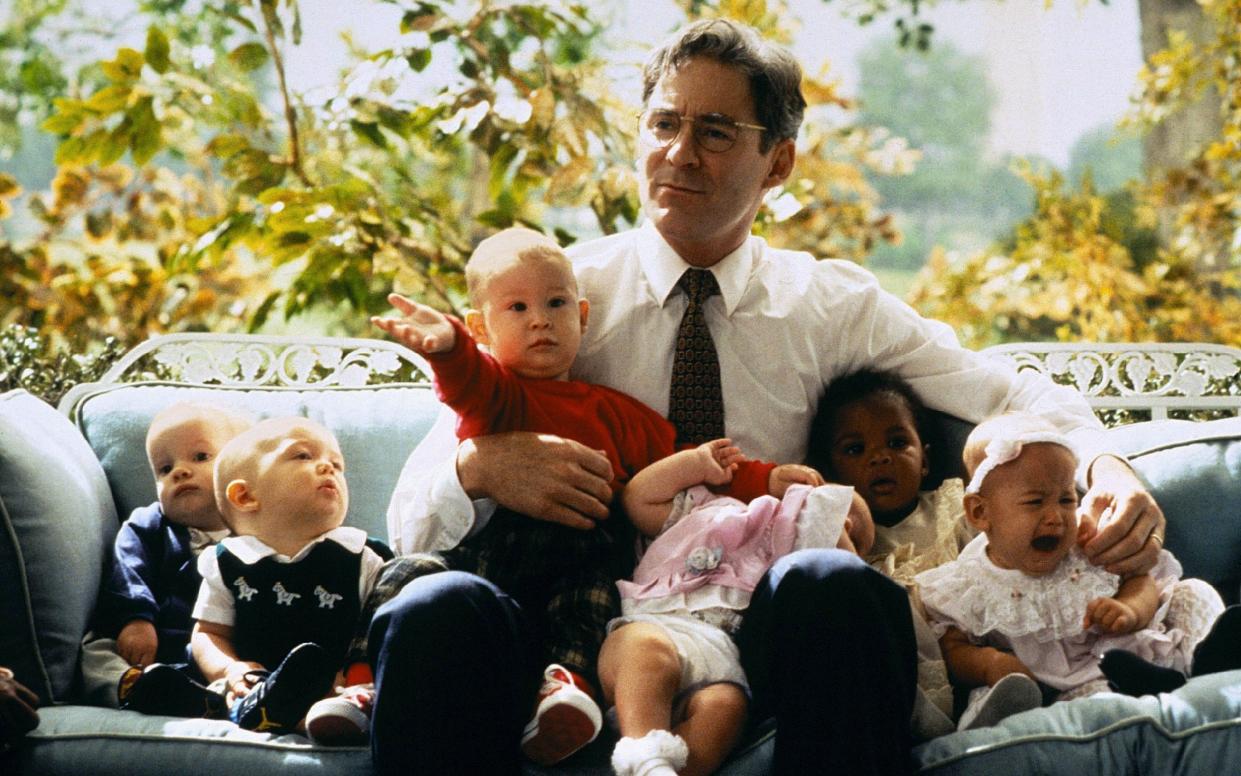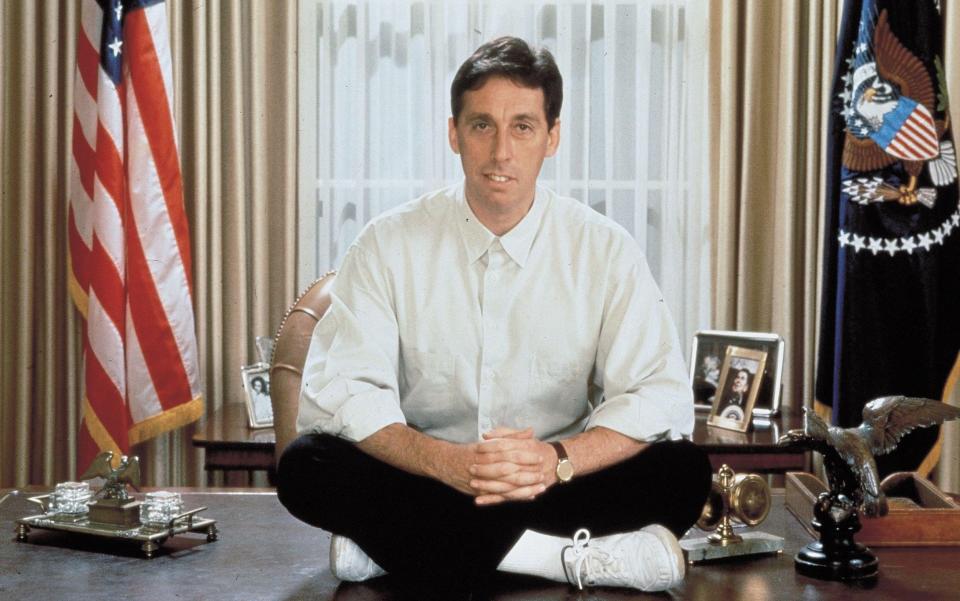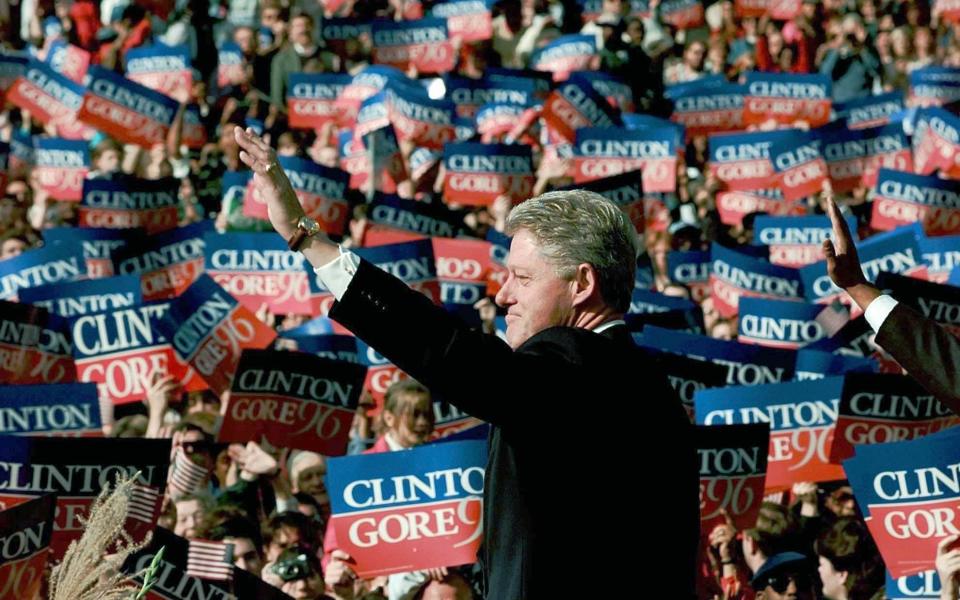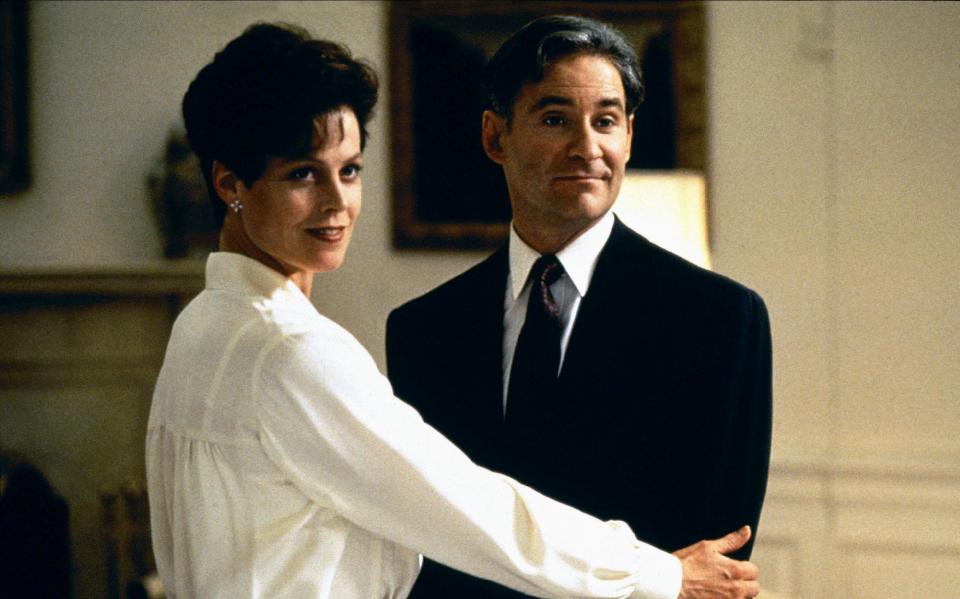How Warren Beatty almost killed Dave – Ivan Reitman's finest film

The death of Ivan Reitman, at the age of 75, on 12 February, has not only robbed contemporary cinema of one of its kindest practitioners, but it also leaves an artistic legacy of almost unparalleled good cheer. From Ghostbusters to Twins, via the likes of Junior, Kindergarten Cop and No Strings Attached, Ivan Reitman’s name on a film usually guaranteed fun.
However, this did not mean that the fun had to be frivolous. While Reitman generally made special effects-heavy and high-concept films, he deviated from his usual cheerily weightless subjects in 1993 to make the Kevin Kline and Sigourney Weaver romantic comedy Dave.
Today, unmemorable title aside, it remains his best film. The tale of how an indisposed US president is replaced by the titular Dave, a hapless but increasingly adept lookalike, who seeks to improve the United States while falling in love with the First Lady, its mixture of pitch-perfect political satire, goofy farce and Capra-esque idealism holds up wonderfully well three decades on.
It hints at a different, perhaps richer, career that Reitman might have had if he’d eschewed eye-popping blockbusters for smaller films. From a political perspective, it was also timely in its rejection of the Reaganite ideals, as presented by the cold, corrupt President William Harrison and its embrace of the warmer, more compassionate Clinton era, as epitomised by the presidential doppelganger, the likeable and idealistic Dave Kovic. Three decades on, it works beautifully as both a savvy Washington-set comedy and a rare display of optimism as to what a kinder, gentler sort of politics could be like.
Its screenwriter Gary Ross had an excellent pedigree when it came to both politics and cinema. His father Arthur A Ross was also a screenwriter. His son said of him in a 1993 Los Angeles Times interview that, during the McCarthy era, Ross Snr was “dark-grey-listed because of his politics. He wasn’t a communist, but he was very involved in liberal causes”. This gave his son a keen awareness of how serious themes might be smuggled into mainstream cinema, as well as a lifelong interest in politics.
He worked on Ted Kennedy’s unsuccessful campaign to secure the Democratic Presidential nomination in 1980, before he sold the screenplay for what became the Tom Hanks vehicle Big to 20th Century Fox; he subsequently received an Oscar nomination for it.
Yet Ross continued to maintain his political interests, and acted as a consultant and speechwriter both for Michael Dukakis’s 1988 presidential campaign and for Bill Clinton’s subsequent, successful 1992 campaign, although he subsequently played this side of his career down. In one interview in 1993, he said: “When they need some jokes they call me… it’s not like I spend half my life writing political stuff. I’m a screenwriter.” He acknowledged, however, that his dual status as both super-connected insider and detached, witty commentator was “kinda cool”.
Ross’s skill as a writer of political gags was unparalleled. As Bill Clinton’s press secretary Dee Dee Myers said: “A lot of people can write funny lines, but Gary can write a joke which also incorporates the candidate’s message and that’s fairly unique.” Her colleague John Emerson praised him in similar terms: “Gary is very politically astute, but he also had a good sense of the pulse of the people. It’s why his sound bites work and why his movies work.”
Ross’s script for Dave combined these skills with a fresh spin on an old premise. It was reminiscent of Frank Capra’s classic Mr Smith Goes to Washington both in premise and tone, pitting uncorrupted idealism against the cynical machinations of contemporary politics. Ross said that he wrote the script inspired by “the megalomaniacal chief of staffs populating the White House in the recent Republican administrations”. Although he came up with the concept in 1988, its unashamedly liberal ambitions made it incongruous, even unfilmable, at a time when Republican presidents such as Ronald Reagan and George HW Bush were in office. It was originally supposed to be financed by Disney, and directed by Superman’s Richard Donner, but even the lightly political overtones deterred the famously risk-averse House of Mouse.
However, Ross’s script had attracted the attention of Hollywood’s arch-liberal Warren Beatty. The director-star had not made an overtly political film since Reds in 1981, and although his two previous films Dick Tracy and Bugsy had both been high-profile, neither had been the major box office success that he was hoping for. He took the screenplay to Reitman, who had established himself as the go-to director for big-budget comedy thanks to successes with Ghostbusters, Twins and Kindergarten Cop.
Reitman, a self-described “conservative-slash-libertarian”, was attracted to the project less for its political themes than for its warmth and idealism. He commented: “Its themes of personal maturity and a sense of taking responsibility for our lives… spoke to a generational change – that our parents were no longer in office – that seemed to be occurring.”

Unfortunately, Beatty was also a difficult and demanding collaborator, prone to exerting his own influence on both directors and studios alike. Therefore, after he had spent several months working on the script with Ross and Beatty, an exhausted Warner Brothers informed Reitman: “We’d rather just do the movie with you, but not Warren.” Loyalty to Beatty led Reitman to leave the project, calling it “one of those impassable situations” and “morally wrong”, only for him to return when a deal with Beatty could not be reached.
The director noted that his intended star was “very pissed at me for a while” afterwards as a result. But Reitman told Beatty: “Look, I’ve waited for a couple months, I’ve walked away from this, but now I’m prepared to go make it and you can do whatever you want. I’ve given you a piece of my back end. And now you have to say yes. I’m giving you five days. And if you don’t come back and agree to this, I’m gonna try to find somebody else.” Beatty refused. Reitman wryly noted: “Then, of course, I couldn’t get anybody to say yes.”
Virtually every major early Nineties leading man was approached for the eponymous dual role. Tom Hanks and Kevin Costner both refused, citing the relative blandness of the Dave character. Ross acknowledged this criticism: “Dave was more of a cipher in the early drafts, a guy who just stumbled into wisdom like Chauncey Gardiner from Being There, instead of being a hero who calls on his inner strength and resolve.” Reitman encouraged Ross to rewrite the character so that Dave grew in both confidence and moral stature; it was coincidental but timely that, in Ross’ conception, the “real” President Harrison was a Republican of the old school, and the “fake” President Dave was a warmer, Clinton-esque liberal.

Eventually, Reitman approached Kevin Kline, who had won an Oscar for his uninhibited performance as an idiotic criminal in A Fish Called Wanda, but was now attempting to branch away from less broad material. He was instead looking for the more dramatic roles that had led to his being described as “the American Olivier” for his stage successes. Kline initially turned down Dave in the belief that Reitman wanted a big, farcical performance.
He noted: “I thought he was casting me for all the wrong reasons.” But a meeting with the director convinced him that, although there were undeniable opportunities for carefully executed slapstick knockabout, it was a more sophisticated proposition.
Kline later recalled: “We were absolutely on the same page about what it should be because it’s not a farce. It's a very delicate sort of romantic comedy.” Describing himself as “not a very political person”, Kline was intrigued by the chance to play someone he called “the guy next door”, which he had not done before.
As he said: “The politics in this were only a backdrop to a Capra-esque story of a guy whose decent values cut through the system.” Reitman assembled an excellent cast that included everyone from his Ghostbusters star Sigourney Weaver as the First Lady Ellen Mitchell, to veteran scene-stealers such as Ben Kingsley and Frank Langella as, respectively, the sidelined Vice President Gary Nance and the film’s antagonist, the Machiavellian Chief of Staff Bob Alexander. Reitman also cast the great Charles Grodin in an uproarious role as Dave’s bemused accountant-cum-conspirator. At one point Grodin declares, while looking at the federal budget: “If I ran my business this way, I’d be out of business.”
In order to increase verisimilitude, Reitman stuffed the film with cameos from real-life politicians and media personalities, leading to guest appearances from the Speaker of the House Tip O’Neill, chat show host Jay Leno and the political pundit Eleanor Clift. One of the drollest such moments comes in a cameo by the film director and conspiracy theorist Oliver Stone, correctly informing Larry King that the president’s replacement is clearly the result of nefarious practices. “Don’t you think that you’re being a little paranoid, Oliver?” King smirkingly scolds him.

Yet the film’s commitment to realism went deeper than simple in-jokes. Reitman remembered: “I wanted to cast real people – journalists and politicians – where we could. I wanted the production design to be as accurate as possible and the acting style had to walk a very fine line between realism and outright comedy.” This showed itself in both small ways – the carpets used on the sets were made by the same weavers who created the ones in the Oval Office – and in greater ones.
Unlike similarly-themed but more cynical contemporary political comedies such as Eddie Murphy’s The Distinguished Gentleman and Tim Robbins’s Bob Roberts, there was an atmosphere of hope that change, as brought in by the young, charismatic Clinton, might finally be coming, and that Dave could be the first film that represented this. It was appropriate that the new president’s 1992 victory party came midway through production, and that it was attended by many of the cast and crew, who were filming nearby in Washington.
By the time that the film was released in May 1993, there was a hope, too, that the new administration was a welcome shift from the tired Bush and Reagan era. The scandals and sleaze that would later engulf the president were yet to come, or at least made public. And so Dave was greatly acclaimed as much for its timeliness and message of change as for its considerable achievements. The critic Roger Ebert wrote: “The movie is more proof that it isn’t what you do, it’s how you do it: Ivan Reitman’s direction and Gary Ross’s screenplay use intelligence and warmhearted sentiment to make Dave into wonderful lighthearted entertainment.”

It became a considerable box office success, was nominated for an Oscar for Ross’s screenplay, and continues to be a touchstone for Democratic politicians. Clinton inscribed a copy of the script for its writer. It was, the president wrote, a “funny, often accurate lampooning of politicians”.
Meanwhile, Barack Obama told Kline: “I love Dave. I love watching it when I’m depressed because you make it look so fun, you make it so easy.” (Kline quipped of Trump: “I think if our current president saw the movie, he’d be rooting for President Mitchell.”)
But it is Reitman’s subsequent judgement on the film that remains key to understanding its perennial popularity as a fantasy about what would happen if someone decent became president. “I love what it says about us as Americans and what we want and hope for and pray for, and the frustration of not getting it.” It is hard to disagree, as this fine film serves as a fitting tribute both to its director and his sentiments.


